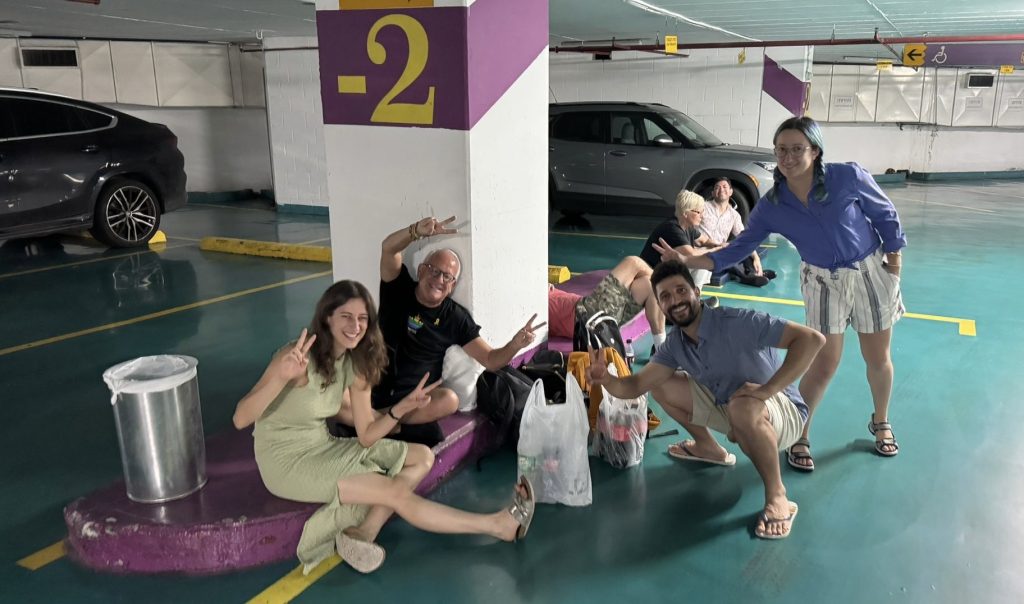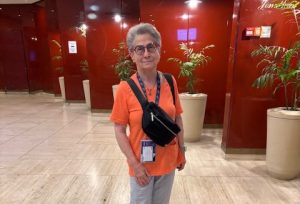Canadians who came to Israel to volunteer, or as part of an international delegation, have found themselves stranded and unable to return home to family and jobs, when airports abruptly closed after Israel’s attack on Iran’s nuclear sites started June 13. Since then, the visitors have faced nights in bomb shelters and reinforced rooms while Iranian missiles have fallen on the centre of the country.
Layla Rodney, 18, is one of those Canadians. The Queen’s University student landed in Israel on April 29 for a traditional 10-day Birthright trip, and she stayed for an additional five weeks for an internship through Birthright’s Onward program.
Rodney was living in Tel Aviv and working at Ethiopian National Project in Lod, a non-profit that facilitates the integration of Ethiopian-Israelis into Israeli society. Her program, which had about 40 participants, was scheduled to end Monday, June 16, the shortest that Onward offers. It is fast-tracked for camp counsellors, and Rodney will be working at Camp Kadimah in Nova Scotia this summer.
On the last day of Rodney’s internship, June 13, the whispers started: Israel was going to attack Iran. Rodney and many others from her program changed their flights to the following day in hopes that they would be able to get home before anything happened. But that night, Israel struck, and the airport was shut down.
At the time, Rodney was out in Tel Aviv with some friends from her program. They all got an alert on their phones at the same time.
“Usually when we hear sirens and things like that, it’s through the apps that you download on your phone, like Tzofar and Home Front Command. And this time it was like a government notice, like when you receive an Amber Alert,” Rodney said.
The alert, which was all in Hebrew, said to stay close to shelter. But they were very far from home and not sure what to do.
“We were kind of just scrambling to find a shelter to go to and we didn’t really know what was going on,” she said. “I was texting with a bunch of people and everyone was giving different opinions. Some people were like, ‘stay where you are in a shelter’ and some people were like, ‘try to get home as fast as possible.’”
Eventually, Rodney and one of her friends decided to scooter back to their apartment, scared the whole time that the sirens would start blaring and they’d be caught out in the open. Ultimately, they made it home safely as no missiles were fired at Israel at that point.
The next few nights, though, were different. While Rodney and her friends were eating Shabbat dinner, they got the first warning that missiles were coming. Shortly after, a missile struck nearby, and they felt the whole building shake. Rodney said it was a terrifying experience.
On Saturday, the Birthright staff informed Rodney and her group that the next day they would be relocated to a town in the south of Israel, away from the missile fire. But they would have to get through one more night in Tel Aviv before that could happen.
That last night, Rodney’s roommates all brought their mattresses into her room, which was the apartment’s safe room, so they could weather the barrage together. They played music and games to get through the night, raising the volume when the sirens started to drown out the sound of the missiles around them.
“It was definitely still extremely scary the second night, but we kind of knew what to expect,” Rodney said.
When they woke up the next morning, they got onto the bus Birthright had organized for them and travelled south.
“Since being here, you can feel that the weight has been lifted off everybody’s chest. Everyone’s significantly less anxious,” Rodney said. “We haven’t even had a singular siren since being here.”
Although Rodney’s two nights in Tel Aviv under missile fire were harrowing, she credits Birthright for taking care of her cohort.
“Birthright has definitely done the most they could do to ensure that we feel safe and it’s clear that they’re trying their best to get us all home,” she said.
Although Rodney could not share any details about how Birthright was planning on getting everyone home, the organization has since reported that it evacuated approximately 1,500 program participants stuck in Israel from Ashdod Port to a cruise ship bound for Larnaca, Cyprus. Some of those participants are Canadian, a representative from Birthright confirmed.
The ship is expected to arrive early Wednesday morning, June 18, and its voyage will be under the close protection of the Israeli Navy. Priority on the voyage was given to Birthright participants who were near the end of their 10-day trip. Once the ship arrives at its destination, the participants will be flown to their hometowns. All transportation costs are covered by Birthright Israel.
Gidi Mark, the CEO of Birthright Israel, coordinated the arrangements in Cyprus and is waiting there for the ship’s arrival.
“Today we witnessed the true spirit of Birthright Israel—not only as an educational journey, but as a global family committed to the safety and well-being of every participant,” Mark said in a statement. “This was a complex and emotional operation, carried out under immense pressure, and we are proud to have brought 1,500 young adults safely to Cyprus. Our team continues to work around the clock to secure solutions for the remaining participants still in Israel.”
Although Mark said the participants were brought safely to Cyprus, at the time of this publication the voyage is still underway.
While Birthright is in the process of securing passage out of Israel for its participants, many people are still unsure about their immediate future. Mark Berlin arrived in Israel on June 9 as part of a North American delegation, invited by Israel’s Ministry of Foreign Affairs, to connect with LGBTQ+ Israelis and attend Pride celebrations in Tel Aviv.
Before that portion of the trip, the group also took part in a more conventional Israel tour, which included stops in Jerusalem, the Nova Festival grounds, and Beersheva. The trip was supposed to continue in Tel Aviv, and conclude on June 15. But the members of the delegation would not have a chance to complete their itinerary.
“We went from Beersheva in the Negev right back to Tel Aviv, where we’ve been ever since,” Berlin said. “I guess the way they curated the trip is, they were taking us out from the darkness to how life really continues in Israel nevertheless. So we arrived in Tel Aviv to the sound of missiles. And that’s been our reality ever since.”

Berlin has a background in international human rights law. He was the head of international programs in the Department of Justice, and a special advisor on the Middle East to Irwin Cotler when he was minister of justice. He also spent years in Ramallah with his work, in the late 1990s and early 2000s. So overall, he knows the region quite well. Even so, he’s never experienced anything like the last few days, diving into bomb shelters and snatching what little sleep he can between sirens.
“I went through Intifada one. I went through Intifada two. Nothing. That doesn’t even come close. That was almost a minimal situation because those were random attacks, in pizza restaurants and hotels, on bus shelters and stuff like that, where one person would go and stab or shoot or whatever. So it was a coordinated act of random acts,” Berlin said.
“This is state-sponsored, state-directed, war-time missiles being shot at Israel. It’s not the same at all. Nothing’s been like this.”
Berlin described his experience as consisting of “two trips.” The first few days he called an extraordinary experience, but the second part he described as terrible and horrific.
“I’m a control freak and I need to be in control of my life and I’ve given up all my ability to control my environment, my situation,” he said. “I’m not in control of any of this and I have to trust the people looking after me.”
Even so, he says, he feels lucky that he doesn’t have to navigate the situation as an independent tourist. The Ministry of Foreign Affairs is keeping him safe and fed, and exploring all the options to get him out–as is the Canadian Embassy. However, as of June 17, no viable options have emerged to get the delegation out.
As much as Berlin has been struggling with the situation, he says the members of the delegation have bonded, and he feels safe where he is. In some ways, he is more worried about his husband and family worrying about him than he is for himself.
Rodney, the Birthright participant, is thinking about people back home as well. But she’s not just thinking about her loved ones who are worried for her. She’s also thinking about all the people who post on social media whenever Israel experiences a crisis, and how different it feels to learn about one from halfway across the world compared to being stuck in the thick of it.
“Being here, it just makes me love Israel, because as much as people are afraid you can’t feel it that much. People just feel proud to be Israeli or proud to be Jewish or proud to be in Israel… It’s really just shown how resilient the Jewish people are and how resilient Israel is.”







